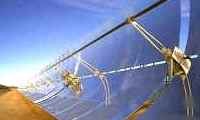About us
The interdisciplinary board of experts looks into the possibility of mutually beneficial cooperation between Europe and Africa in the area of renewable energy. The general technical feasibility of large-scale CSP-projects is endorsed by the SEPA-panel, but further considerations of judicial, political, social, geographical, and historical preconditions need to be assessed to guarantee a successful implementation of the project. Only then the participation structure can be coequal for the African and European parties.
 |
Since its formation in 2007, the board discusses and analyzes chances and risks of solar thermal cooperation on the basis of latest technological knowledge. The unique composition of this group allows a broad consideration of the subject out of the perspectives of political, economic, and social science, as well as law, history, and geography. Numerous seminars, an extensive network of African-European cooperation, international conferences, form a broad and versatile outlet to evaluate the concrete initiatives of the project. On the one side Africa has the potential of generating unlimited electric energy with concentrating solar power, but a technological gap prevents this from being realized. And on the other side Germany offers sophisticated technology, but lacks enough solar irradiation to run solar thermal power stations in an economic efficient way. Matching the needs of both countries, cooperation in solar-energy is a suitable conclusion to draw and mutually beneficially. This theoretical win-win-situation is often presented and although being technically feasible in the main, projects have failed in the past due to political, or economic, or cultural barriers. In the context of a new global discussion of climate change and increasing prices for fossil fuels (coal, gas, oil), one can not only talk about a chance for a solar thermal energy cooperation between Africa and Europe, one can even say that it is a necessity. Two ways for fair trade with solar energy:
Cooperation Typ II (with wire): A modern high-voltage direct current grid enables a low-loss transport of solar energy from Africa to Europe at competitive costs. The solar energy potential of the Sahara region is more than enough to cover European energy demand. Especially large-scale solar thermal power stations are adequate to meet these needs. |
|---|

